A basal implant is a revolutionary dental solution designed to provide stability and functionality for individuals with significant bone loss. Unlike traditional dental implants, which often require a solid foundation of alveolar bone, basal implants utilize the dense cortical bone, making them an ideal choice for patients who have experienced severe jawbone resorption or are unable to undergo lengthy grafting procedures.
What Is a Basal Implant?
A basal implant is a type of dental implant anchored primarily in the basal or cortical bone rather than the more superficial alveolar bone. This distinction makes basal implants particularly useful for patients who have minimal bone density or where conventional implants would typically fail.
Anatomy: Basal Bone vs Alveolar Bone
The distinction between basal bone and alveolar bone is crucial in understanding how basal implants function.
- Basal Bone: This type of bone is located at a deeper level in the jaw and holds more strength. It is denser and more stable than alveolar bone, serving as a robust base for supporting implants.
- Alveolar Bone: On the other hand, this bone surrounds the tooth roots and is less dense. It can be affected significantly by tooth loss, leading to resorption and making it difficult to support standard implants.
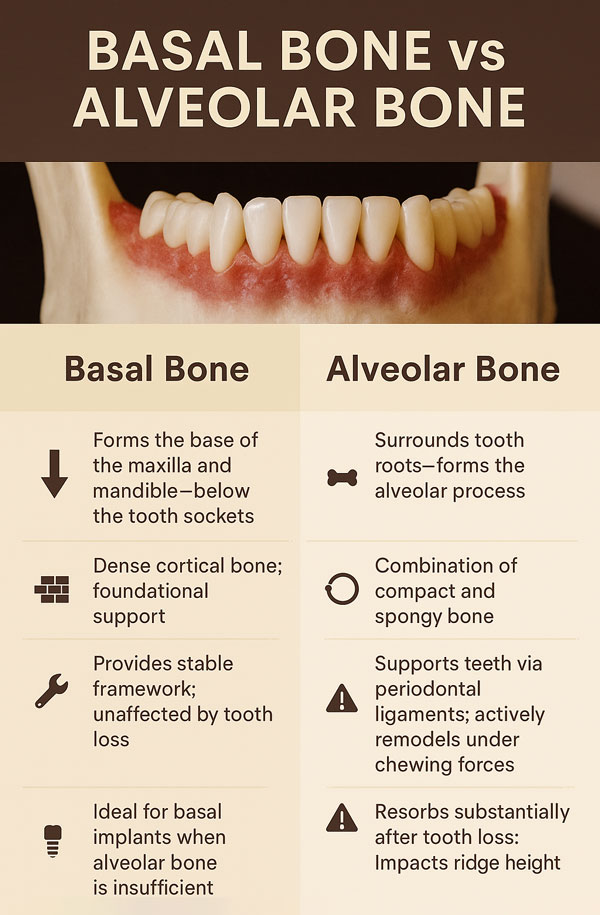
How It Differs from Conventional Implants
Conventional dental implants primarily rely on the presence of adequate alveolar bone for placement. When there’s insufficient bone, patients may need complex procedures like bone grafting before they can receive these implants. In contrast, basal implants are uniquely designed to bypass these hurdles, focusing instead on the more robust cortical bone, thus significantly reducing treatment time and enhancing the chances of successful implantation.
How Basal Implants Work
Understanding how basal implants work requires delving into their surgical process, design, and materials utilized.
Insertion into Cortical Bone
The insertion of a basal implant begins by identifying the appropriate site in the cortical bone. The process involves:
- Evaluating the patient’s unique anatomical structure using imaging technologies like CT scans.
- Creating a pilot hole in the cortical bone, where the implant will be placed. This is critical because the implant must achieve primary stability in this dense area to ensure long-term success.
Design and Materials Used
Basal implants feature a unique design that caters to immediate loading. They are typically made from biocompatible materials such as titanium or zirconia, which promote osseointegration—the process through which bone cells grow and attach themselves to the implant’s surface.
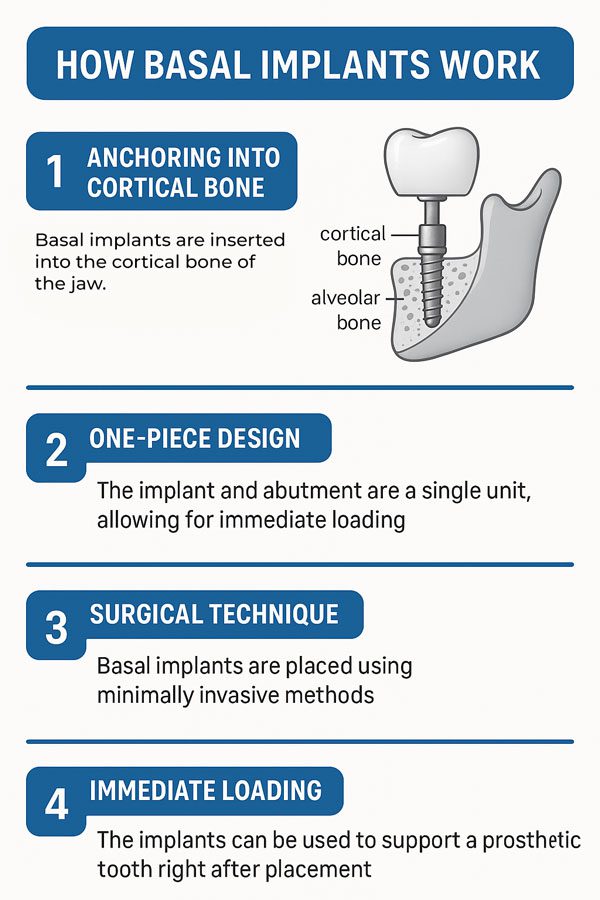
These implants come with various surface treatments designed to enhance stability and promote faster healing. The geometrical design varies, allowing them to adapt to different clinical situations, providing versatility in challenging cases.
The Surgical Process
The surgical process for placing a basal implant is relatively straightforward, but must be carried out by an experienced implantologist:
- Consultation: The initial step includes a thorough examination and imaging to assess bone quality and quantity.
- Anesthesia: Local anesthesia is administered to ensure a pain-free experience during the procedure.
- Implant Placement: After preparing the site, the basal implant is inserted into the cortical bone.
- Immediate Loading: If applicable, the dentist may place a provisional crown on the same day, allowing patients to regain function swiftly.
Immediate Loading Explained
One of the key advantages of basal implants is the possibility of immediate loading. This means that after the implant is placed, a temporary prosthetic can be fixed on the same day, enabling patients to chew effectively without prolonged waiting periods.
Immediate loading is particularly beneficial for elderly patients or those with full arch loss, as it allows for immediate restoration of function and aesthetics. Moreover, it enhances patient satisfaction, as they can walk away from the clinic with improved oral functionality almost immediately.
Benefits of Basal Implants
The benefits of basal implants are extensive and cater to a wide range of patient needs.
No Bone Graft Required
One of the primary appeals of basal implants is that they do not necessitate bone grafting procedures. This is especially advantageous for those with significant bone loss, as grafting can be painful, expensive, and time-consuming.
For many patients, avoiding bone grafts can simplify the treatment plan drastically, leading to quicker resolutions in restoring their smiles and functionalities.
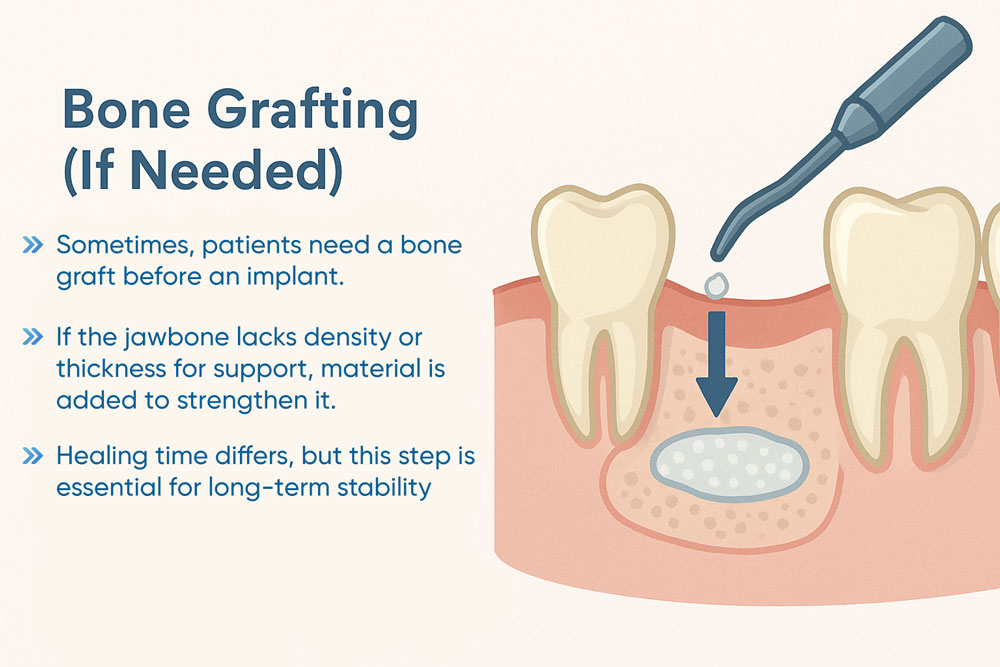
Shorter Healing Time
Compared to traditional implants, those in the basal implant category tend to have shorter healing times. This is due to their innovative design and placement techniques that leverage the stability of cortical bone.
Patients often find themselves experiencing a more streamlined recovery, allowing them to enjoy their restored smiles sooner than anticipated.
Suitable for Difficult Cases
Basal implants shine in cases where conventional implants might struggle. This includes scenarios involving:
- Elderly patients with chronic conditions that affect bone density.
- Smokers, whose habits may compromise healing.
- Diabetics may have reduced healing capabilities.
The adaptability of basal implants empowers dental professionals to offer solutions to diverse populations that were previously considered unsuitable for traditional implants.
Faster Restoration of Chewing Function
The immediate loading capacity of basal implants ensures that patients can return to normal oral functions rapidly. Unlike patients who undergo several months of healing following traditional implant placements, those opting for basal implants can experience swift restoration of chewing abilities.
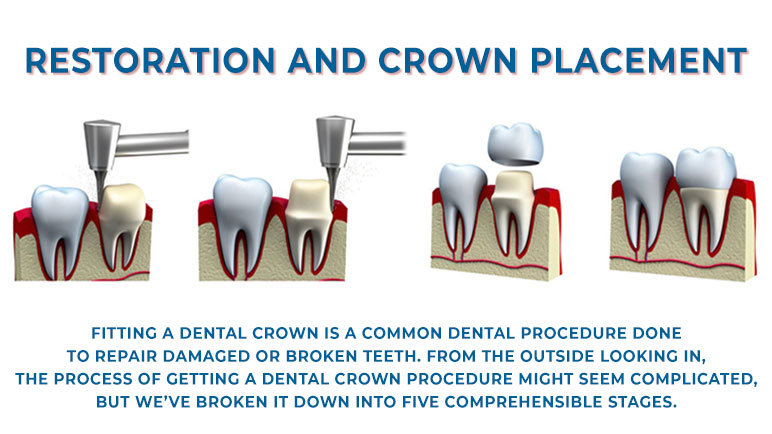
This rapid turnaround also significantly enhances the overall quality of life, allowing patients to engage in social activities without the worry of dietary restrictions or uncomfortable gaps in their smiles.
Limitations and Risks
While basal implants offer numerous advantages, there are limitations and risks associated with their use.
Requires an Experienced Implantologist
The placement of basal implants necessitates a skilled and experienced implantologist. Their intricate nature means that any misalignment or improper installation could lead to complications such as implant failure or inadequate integration.
To ensure a successful outcome, it is essential that patients seek practitioners who specialize in basal implants and possess a robust track record of success in these procedures.
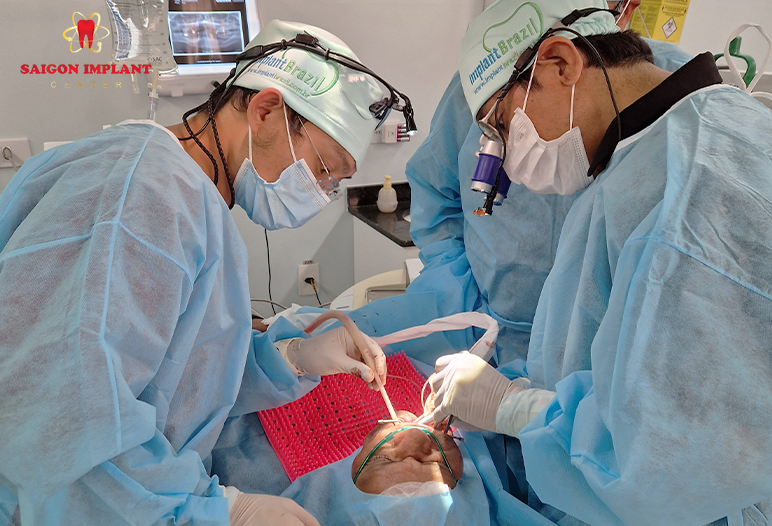
Not Suitable for All Bone Structures
While the adaptability of basal implants is noteworthy, they are not universally suitable for every individual’s bone structure. Some patients may still exhibit conditions that render them poor candidates for this implant type.
Additionally, certain anatomical features or defects might complicate the insertion of basal implants, making a thorough consultation an absolute prerequisite.
Limited Availability
Another limitation is that basal implants may not be widely available in all regions. Depending on local dental practices, access to trained implantologists specializing in basal implants could pose a challenge for prospective patients.
As awareness grows about the benefits of this innovative approach, it is likely that accessibility will improve; but for now, patients may need to travel to urban centers or specialized clinics to receive this treatment.
Long-Term Studies Still Evolving
Although initial outcomes for basal implants look promising, long-term studies documenting their success rates and potential complications are still in their infancy. As research continues, it is imperative for patients to stay informed and consult with their dental providers regarding the most current data.
Who Is a Good Candidate?
Identifying the right candidate for basal implants is crucial in maximizing the treatment’s success.
People with Severe Jawbone Resorption
Individuals suffering from severe jawbone resorption are prime candidates for basal implants. Since these implants anchor into the more stable cortical bone, they offer a viable solution for those who have lost substantial amounts of alveolar bone.
This option provides hope for many patients who otherwise had limited choices for restoring their dental functionality.
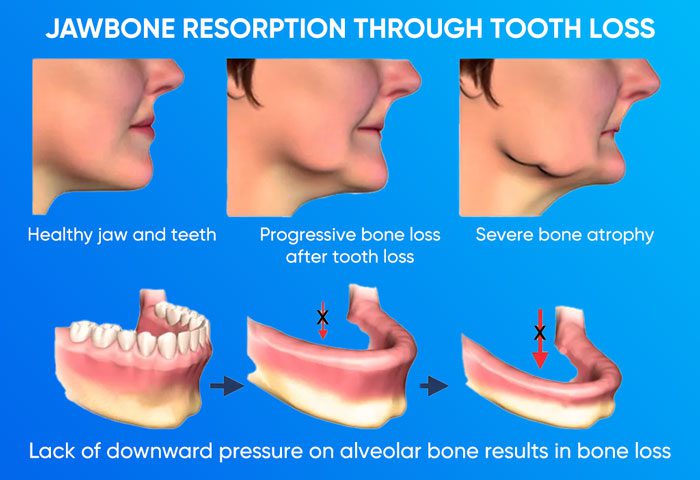
Patients with Full Arch Loss
Those facing complete edentulism (total loss of teeth) can also benefit significantly from basal implants. Given the ability to load them immediately, patients can regain their ability to chew and speak naturally, transforming their quality of life.
The implementation of basal implants in full arch restorations is often less invasive compared to traditional methods, further emphasizing their suitability.
Those Seeking Immediate Function
For patients eager to have their teeth restored quickly, basal implants present an attractive alternative. The immediate loading capability means that these patients can efficiently transition back to normal eating and social interactions.
This option is particularly appealing for those who may have upcoming social events or personal milestones requiring a confident smile.
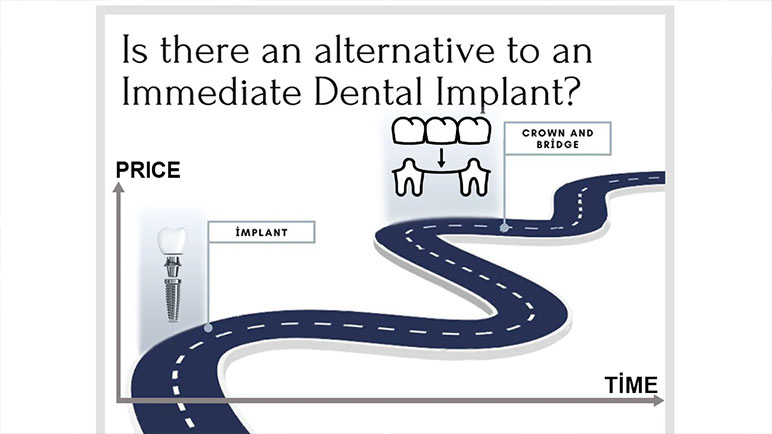
Contraindications to Consider
While many can benefit from basal implants, certain contraindications exist. Patients with active infections, specific systemic conditions, or existing parafunctional habits (like bruxism) should discuss these concerns with their dental provider.
Each case is unique, and careful evaluation is necessary to determine the best course of action for each individual.
Cost of Basal Implants
When considering basal implants, understanding the financial implications is vital for prospective patients.
Estimated Price Range
The cost of basal implants can vary widely based on location, the complexity of the case, and the experience of the implantologist. Generally, prices may range from $1,500 to $4,000 per implant, including associated procedures such as crowns or prosthetics.
It’s essential to consult with a dental professional to obtain an accurate estimate tailored to the specifics of your situation.
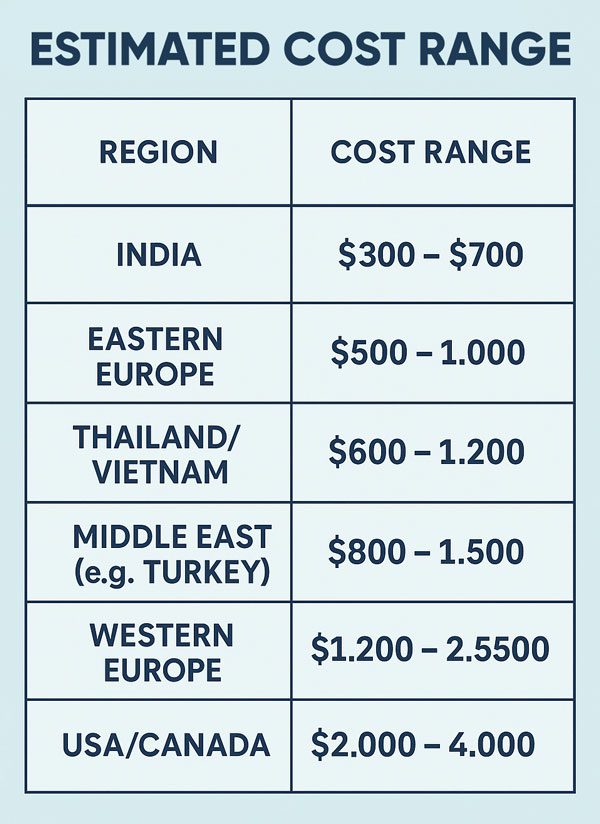
Factors Affecting Cost
Several factors can influence the cost of basal implants, including:
- Location of the dental practice: Urban centers may charge more than rural areas.
- Experience of the practitioner: Highly skilled professionals with advanced training may command higher fees.
- Technology used: The introduction of cutting-edge technology and materials can also affect pricing.
Comparison with Traditional Implants
When comparing costs, while basal implants may initially seem comparable to traditional implants, the savings obtained through avoiding grafting procedures can make them more economical in the long run. Additionally, fewer follow-up visits may reduce overall expenses related to treatment.
Moreover, the accelerated healing time associated with basal implants can translate to lower costs over an extended period as patients return to regular living more quickly.
Conclusion
In summary, basal implants represent an innovative approach to dental restoration, offering numerous advantages such as the elimination of bone grafts, shorter healing times, and the ability to cater to patients with challenging dental conditions. They present a compelling option for those struggling with severe jawbone resorption or seeking immediate functional restoration. For optimal results, it is advisable to consult specialized dental centers that focus on this cutting-edge technology. Taking the first step towards restoring your smile and chewing function can significantly impact your quality of life—consider booking a consultation with an experienced implantologist today to explore your options.

 Google Reviews
Google Reviews Call
Call
SAIGON IMPLANT CENTER
Best dentist in Vietnam
Saigon Implant Center - Dental Clinic utilizes the latest technology for specialized treatment in the field of Single implant, full jaw implants, All on 4 implants, All on 6 implants, Zygoma implant....
SAIGON IMPLANT CENTER
Best dentist in Vietnam
Saigon Implant Center - Dental Clinic utilizes the latest technology for specialized treatment in the field of Single implant, full jaw implants, All on 4 implants, All on 6 implants, Zygoma implant....